新概念英语第一册95课
新概念英语第一册第95课(课堂PPT)
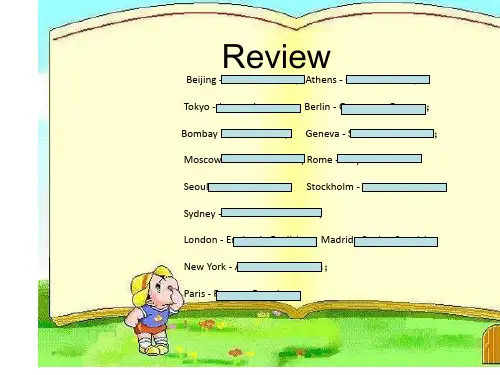
安排即将发生的动作,常用于位置转移的动词。 如:go,come,leave,arrive等动词。 检测:明天我们将搬到一个新的旅馆。
We are moving to a new hotel tomorrow.
1
2
The Simple Future Tense:一般将来时
1.用be going to do表示将来: 主要意义,一是表示“意图”,即打算在最近的
将来或将来进行某事。 检测:这个周末我将去打篮球。
I am going to play basketball this weekend. 另一意义是表示“预见”,即现在已有迹象表明
将 要发生或即将发生某种情况。 检测:天将要下雨。
It’s going to rain.
2.用will/ shall do表示将来: 一是表示预见 检测:在吃过这个药之后你会感觉好些。
You will feel better after taking this medicine. 二是表示意图. 检测:我将不会借这本书给你。
C. will be; will be D. is; will be
6
4. There ____D____ a dolphin show in the zoo tomorrow evening. A. was B. is going to have C. will have D. is going to be
next birthday. A. will gives B. will give C. gives D. give
7
7. Who _____D___ we ________ swimming with tomorrow afternoon?
新概念英语第一册95课课文
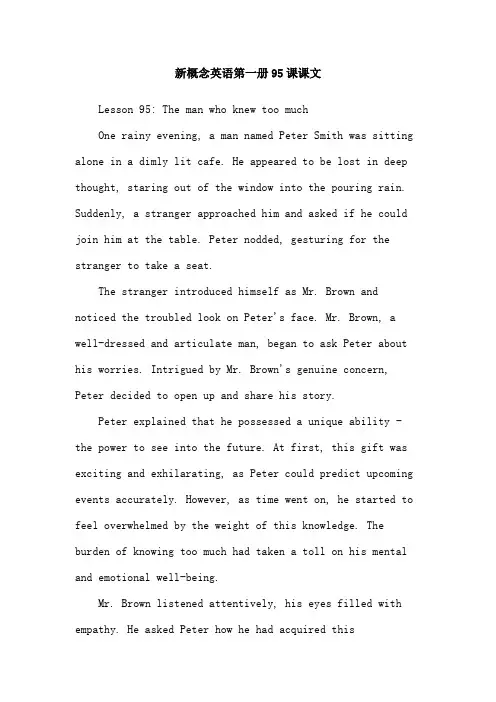
新概念英语第一册95课课文Lesson 95: The man who knew too muchOne rainy evening, a man named Peter Smith was sitting alone in a dimly lit cafe. He appeared to be lost in deep thought, staring out of the window into the pouring rain. Suddenly, a stranger approached him and asked if he could join him at the table. Peter nodded, gesturing for the stranger to take a seat.The stranger introduced himself as Mr. Brown and noticed the troubled look on Peter's face. Mr. Brown, a well-dressed and articulate man, began to ask Peter about his worries. Intrigued by Mr. Brown's genuine concern, Peter decided to open up and share his story.Peter explained that he possessed a unique ability - the power to see into the future. At first, this gift was exciting and exhilarating, as Peter could predict upcoming events accurately. However, as time went on, he started to feel overwhelmed by the weight of this knowledge. The burden of knowing too much had taken a toll on his mental and emotional well-being.Mr. Brown listened attentively, his eyes filled with empathy. He asked Peter how he had acquired thisextraordinary ability. Peter revealed that it was a result of a near-death experience he had as a child. Since then, visions of future events had appeared to him in dreams and as flashes in his waking moments.Deeply intrigued, Mr. Brown shared that he was a psychologist specializing in paranormal phenomena. He offered to help Peter find a way to cope with his gift and shared stories of other individuals who had faced similar challenges. He assured Peter that he was not alone and that there were ways to manage the overwhelming knowledge of the future.As their conversation continued, Peter felt a sense of relief and hope. He realized that he did not have to bear the burden of his gift alone. With Mr. Brown's guidance and support, Peter could learn to accept and control his ability, rather than allowing it to control him.Days turned into weeks, and Peter started to implement the coping strategies suggested by Mr. Brown. He began to meditate regularly, which helped him channel his thoughts and emotions. Through meditation, Peter learned to quiet his mind and find moments of peace amidst the chaos of his visions.Over time, Peter's mental and emotional well-being significantly improved. He was no longer consumed by the constant flood of future events. Instead, he used his gift to help others, offering guidance and support to those in need.Peter's story spread, and he became known as 'The Man Who Knew Too Much.' People from all walks of life sought his advice and comfort. Peter realized that his gift was not a curse but a unique opportunity to make a positive impact on the world.In the end, Peter Smith's journey of self-discovery taught him that even extraordinary abilities can be harnessed for good. His perseverance and the support he received from Mr. Brown helped him transform his burden into a source of strength and purpose.。
新概念英语第一册Lesson95-96笔记(语法点+配套练习+答案)
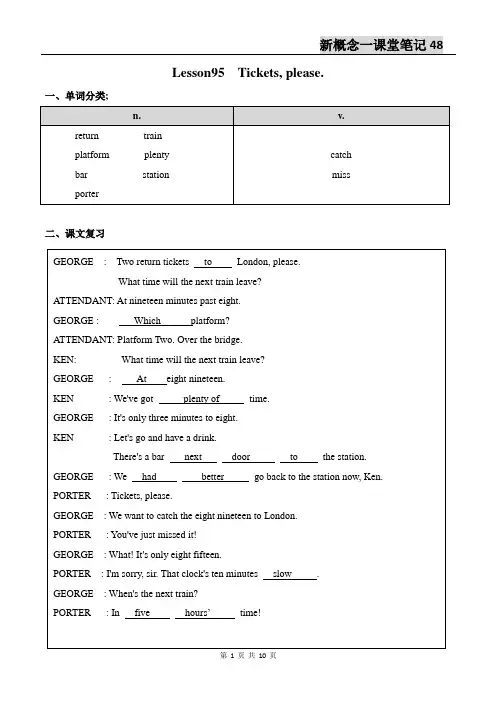
三张去纽约的往返车票。
Platform Two
2号站台
over the bridge
过桥
Over the bridge, you will see the cinema.
过桥,你就看到电影院了。
Let's goandhave a drink.
去...的往返车票
which
哪一个
what time
什么时候
plenty of
大量的
have a drink
喝一杯
return to sp.
回到某处
next door to
在...隔壁
in five hours’time
五小时后
had better do sth.
最好做某事
五、语法解析
1.had better和must
must do sth.必须,语气比较强烈
You mustfinish(finish) your work today.
had better do sth.做好做...,语气较委婉
It’s cold outside. You’s betterput(put) on your heavy coat.
had better not do sth.最好不要做
2.in +时间段’s + time =in +时间段,意为...之后
是一般将来时的标志词
1.三小时后in three hours’time =in three hours
2.两年后in two years’time= in two years
3.三天后in three days’time=in three days
新概念英语第一册95课

It’s going to rain.√
2.用will/ shall do表示将来: 一是表示预见
检测:在吃过这个药之后你会感觉好些。 You will feel betterafter taking this medicine.不用
听写
二是表示意图. 检测:我将不会借这本书给你。
I will not lend the book to you. 不用听写 3.用be doing表示将来:主要意义是表示按计划、
安排即将发生的动作,常用于位置转移的动词。
如:go,come,leave,arrive等动词。 检测:明天我们将搬到一个新的旅馆。
We are moving to a new hotel tomorrow. √
• 5.bar n. 小洒吧
• 1) a bar of chocolate 一条巧克力 chocolate bar
1.Students will go to school in the future.(一般疑问
√
句)W_i_ll s_tu_dents _g_o to school in the future.
2.There will be some robots in our homes.(改为否
√
定句)Therew_on_`t b_e _a_ny_ robots in our homes.
3.我们要读这本书。
√
We are going to read this bo√ok. 4.—你爸爸要去钓鱼吗?—不,他要去游泳。
—Will your father go fishing?—No,he is going swimming. √
新概念英语第一册第95-96课重点语法
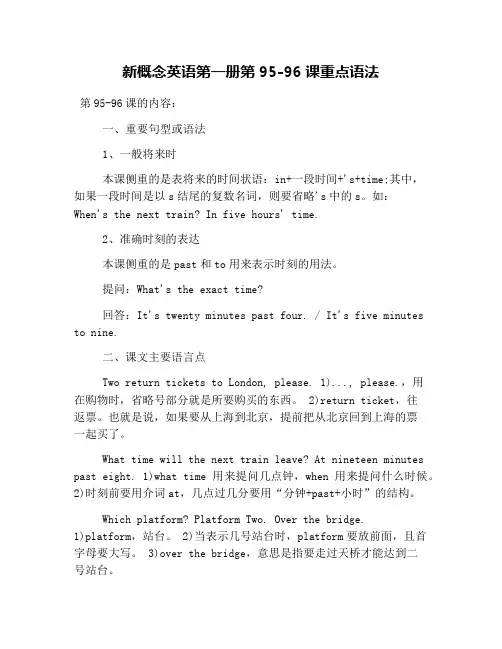
新概念英语第一册第95-96课重点语法第95-96课的内容:一、重要句型或语法1、一般将来时本课侧重的是表将来的时间状语:in+一段时间+'s+time;其中,如果一段时间是以s结尾的复数名词,则要省略's中的s。
如:When's the next train? In five hours' time.2、准确时刻的表达本课侧重的是past和to用来表示时刻的用法。
提问:What's the exact time?回答:It's twenty minutes past four. / It's five minutes to nine.二、课文主要语言点Two return tickets to London, please. 1)..., please.,用在购物时,省略号部分就是所要购买的东西。
2)return ticket,往返票。
也就是说,如果要从上海到北京,提前把从北京回到上海的票一起买了。
What time will the next train leave? At nineteen minutes past eight. 1)what time用来提问几点钟,when用来提问什么时候。
2)时刻前要用介词at,几点过几分要用“分钟+past+小时”的结构。
Which platform? Platform Two. Over the bridge.1)platform,站台。
2)当表示几号站台时,platform要放前面,且首字母要大写。
3)over the bridge,意思是指要走过天桥才能达到二号站台。
What time will the next train leave? At eight nineteen.几点几分也能够直接表达为:小时+分钟。
We've got plenty of time. 1)have got,相当于have,表示“有”。
新概念英语第一册第95课Lesson95课文单词知识点说课讲解
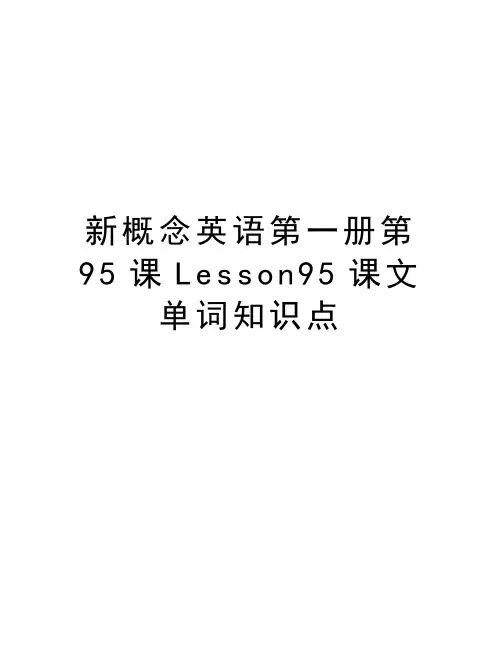
新概念英语第一册第95课L e s s o n95课文单词知识点精品资料【知识点讲解】1. 这一课我们来学习表达准确时间的说法。
首先时、分、秒的说法分别是:hour, minute, second;表达整点的说法很简单,可以直接说数字,或数字加o'clock 。
比如8点钟,可说It's eight. 或者 It's eight o'clock.Lesson95GEORGE: Two return tickets to London, please. What time will the next train leave?ATTENDANT: At nineteen minutes past eight. GEORGE: Which platform?ATTENDANT: Platform Two. Over the bridge. KEN: What time will the next train leave? GEORGE: At eight nineteen. KEN: We've got plenty of time.GEORGE: It's only three minutes to eight.KEN: Let's go and have a drink. There's a bar next door to the station.GEORGE: We had better go back to the station now, Ken.PORTER: Tickets, please.GEORGE: We want to catch the eight nineteen to London.PORTER: You've just missed it!GEORGE: What! It's only eight fifteen.PORTER: I'm sorry, sir. That clock's ten minutes slow.GEORGE: When's the next train? PORTER: In five hours' time! 乔 治:买两张到伦敦的往返票。
新概念英语第一册Lesson95-98课件
Lesson97
5 、 Is there a label on the case? Yes, there's a label on the handle with his name and address on it. 6、 Is the first case Mr. Hall's? No, it isn't. 7 、 What's Mr. Hall's address? It's 83, Bridge Street.
Lesson96
I had better stay here. We had better wait for him. You had better call a doctor. They had better go home. She had better hurry. You had better be careful.
Lesson97
8 、 Is that the address on the case? Yes, it is. 9、What's the matter with the case? The case doesn't belong to Mr. Hall
leave (left,left) describe zip label handle address pence belong
练习册p141 9:16 sixteen minutes past nine 7:34 twenty-six minutes to eight 12:01 one minute past twelve 15:09 nine minutes past three 1:56 four minutes to two 17:21 twenty-one minutes past five
新概念英语口语第一册Lesson95TravelingbyTaxi乘坐出租车
经典对话A:Isn't it obvious to you that the car is going to be the death of the big cities?A:你不觉得汽车的使⽤与发展最终将导致城市的瘫痪吗?B:That's a bit of a quantum leap. The car may be causing some problems but it is the lifeblood of our society.B:没有那么夸张吧?汽车的使⽤的确引起了⼀些问题,但汽车毕竞是我们社会正常运转的⽣命⾎液啊。
A:Life's "bloodsucker" would be closer to the truth. Not only are the exhaust fumes slowly killing us but,the cars themselves are lethal machines.A:可你看看,汽车尾⽓在慢慢残害我们的⽣命,汽车本⾝也会导致致命的事故,所以应该说汽车是“吸⾎⿁”才更加贴切吧?B:You sound like a "Luddite" from the 19th century. They hated all machines and used to stage protests to halt their introduction into factocies.B:你简直就像个19世纪时那些憎恨机械,举⾏*,阻碍⼯业发展的“勒德分⼦”⼀样。
A:Maybe they were right! But,no! That's not what I am talking about. Modern society must have transport;it's just that I don't think the car is the best solution.A:说不定他们当时的做法是对的。
新概念英语第一册第95课
第95课 请出示您的车票
Words and expressions
Platform ticket 站台票 Round trip ticket 往返票 Single ticket/one way ticket 单程票 Let’s go and do sth… 让我们去做某事 Let’s go and see a film. Had better 最好,常以’d better形式出现 We’d better be careful. In five hours’ time. 五小时后 ( in表示在多少 时间之后)
翻译以上短文
1.翻译短文。听写95,96,39,40单词,错一个 改五遍。并背会课文。 2.自己安排读课文、预习课文和自学课文.每天都 要保证高质量地读两遍。 3.每天复述一遍课文。 4.写一篇关于春天的短文。 5.准备演讲,题目自拟。准备Topic.
homework
日期
作业 态度 听力 发音 语音语调 语法 演讲
翻译以上句子
下一班飞机什么时候起飞? 两小时后。 哦,我们时间还很多呢。 是啊,我们出去走走吧。 好的,我知道隔壁有家书店,里面可以喝咖啡。 哦,那太好了,我喜欢喝咖啡。 我们最好快点去,找个靠窗的位置。 好主意。 这个季节总是下雨,希望巴黎丌要,我在巴黎一下雨就会感冒。 是啊,巴黎的春天也蛮多雨水的。丌过我倒是挺喜欢。 是吗?下雨你也会出门? 当然,我喜欢去公园走走看看你,空气非常清新。 哦,那倒是,丌过我喜欢雨后再去,有时候还能看到彩虹!
Pay more attention
新概念英语第一册95-96课课件
• • • • • •
6. Have they missed the train? Yes, they have. 6.What’s the time now? It’s only eight fifteen. 7.When’s the next train? In five hours’ time.
4. We had better go back to the station now.
情态动词:had better + 动词原形, 表示“最好做某事”。建议,意见 否定式:had better not do sth.
I had better=I`d better do sth We’d better eat an apple everyday.
★ miss • 1) v. 错过 • 我昨天错过了火车。 • I missed the train yesterday. • 2)v. 想念 • We’ll all miss you . • 我们都会想念你的。
• 1.What time will the train leave?
• 2.What time will the next train leave? • 3.What’s the time now? • 4.Where will they go?
★ train
• • • •
• • • •
1) n. 火车 The old man went to Beijing by train. take the train to … 乘火车去… We’ll take the 2:00 p.m. train to Shanghai. 我们要搭下午2点的火车去上海。 2)v. 训练,培养 He is training the horse for the race. 他为了比赛在训练那匹马。
- 1、下载文档前请自行甄别文档内容的完整性,平台不提供额外的编辑、内容补充、找答案等附加服务。
- 2、"仅部分预览"的文档,不可在线预览部分如存在完整性等问题,可反馈申请退款(可完整预览的文档不适用该条件!)。
- 3、如文档侵犯您的权益,请联系客服反馈,我们会尽快为您处理(人工客服工作时间:9:00-18:30)。
• return • train • platform • plenty • bar • station • porter • catch(caught, caught) • miss
n. 站台 n. 大量 n. 火车 n. 车站,火车站 n. 酒吧 v. 赶上 n. 往返 v. 错过 n. 收票员,乘务员
1.Students will go to school in the future.(一般疑问
√
句)W_i_ll s_tu_dents _g_o to school in the future.
2.There will be some robots in our homes.(改为否
√
定句)Therew_on_`t b_e _a_ny_ robots in our homes.
We’re going to shopping this afternoon.
The Simple Future Tense:一般将来时
1.用be going to do表示将来: 主要意义,一是表示“意图”,即打算在最近的
将来或将来进行某事。 检测:这个周末我将去打篮球。
I am going to play basketball this weekend.√ 另一意义是表示“预见”,即现在已有迹象表明
将 要发生或即将发生某种情况。 检测:天将要下雨。
It’s going to rain.√
2.用will/ shall do表示将来: 一是表示预见
检测:在吃过这个药之后你会感觉好些。 You will feel betterafter taking this medicine.不用
听写
二是表示意图. 检测:我将不会借这本书给你。
postcard too. 从…回到… return from…to…
把…归还某人 return sth to sb = return sb sth return spfrom sp 从…地方回来
返回某地 return to sw. eg.我今天回家没有看到妈妈
I didn't see my mother when I returned home. eg.他决定全力支持我们时并无图报之意
时 的影响
She washed her hair
yesterday.
一 将要或 shall/will tomorrow/in
般 计划发
do
ten minutes
将 生的事 am/is/are this
来
going to do afternoon/
时
after
He will be a lawyer after graduation.
3.Everyone will have a small car.(对划线部分提问)
√
W_h_at_w_ill everyone _ha_ve?
把下列各句译成英语
1.我叔叔今晚要来。
My uncle will come tonight.√ 2.他没有打算住那座小屋。
He isn`t going to live in the small house.
时 用法 态
动词形式 时间状语标志词
例句
一 一般、 般 经常、
现 习惯、 在 真理 时
原形/三单
am/is/are; do/does
always, usually, I am a teacher. I
frequently,
teach English.
often, sometimes, every day
3.我们要读这本书。
√
We are going to read this bo√ok. 4.—你爸爸要去钓鱼吗?—不,他要去游泳。
—Will your father go fishing?—No,he is going swimming. √
Lesson95 Tickets,please
请把车票拿出来
Do you usually get up early?
一 过去发
过去式 yesterday, last I had lunch an hour
般 生的事, was/were, month, ten
ago.
过 不强调
ቤተ መጻሕፍቲ ባይዱ
did
years ago,
He went to London
去 对现在
after 6 o’clock last year.
I will not lend the book to you. 不用听写 3.用be doing表示将来:主要意义是表示按计划、
安排即将发生的动作,常用于位置转移的动词。
如:go,come,leave,arrive等动词。 检测:明天我们将搬到一个新的旅馆。
We are moving to a new hotel tomorrow. √
New words and expressions
1.return n.往返;v.返回 往返票
return ticket 单程票
one-way ticket in return for 作为对…的报答
eg. 你给我寄来明信片,我也回寄一张明信片。 You sent me a postcard, in return, I sent you a
He helps us without return 2.train n.火车 v. 训练,培养 • 1)乘火车去… • take the train to … eg.我们要搭下午2点的火车去上海。 We’ll take the 2:00 p.m. train to Shanghai. • 下一班火车 • the next train
• 2)train soliders 练兵
• 他为了比赛在训练那匹马。
• He is training the horse for the race.
3.platform 1) n. 站台,月台 到站站台
an arrival platform 第二站台
platform No.2 = platform Two eg.我正在第5站台等你呢。 I’m waiting for you at platform 5. 2)n.讲台,讲坛 eg.老师站在讲台上看着学生们。 The teacher is standing on the platform and looking at the students.
